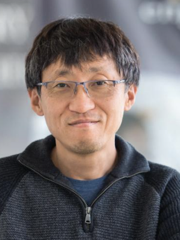Abstract
This presentation will discuss our recent collaboration with University of Pittsburgh Medical Center where we deployed a computational analysis of big cancer and drug data aided by pulmonary hypertension specific knowledge to explore repurposing of cancer drugs for pulmonary hypertension.
Pulmonary hypertension (PH) is a fatal and incurable vascular disease. Chemotherapies are being considered for PH treatment, but there is no method for effective screening of these drugs for this disease. In this study, we leverage the molecular parallels between cancer and PH to define novel pathogenic mechanisms and facilitate effective computational repurposing of chemotherapies for PH.
We used a computational algorithm EDDY (Evaluation of Differential DependencY) to identify chemotherapeutics that depend upon differentially rewired PH-related gene clusters. Computational findings wer validdated through in vitro and in vivo experiments. The results establish the validity for a pipeline of computational predictions of therapeutic benefit and toxicity for chemotherapies not yet been possible in PH.
Speaker
Dr. Seungchan Kim is a Chief Scientist and Executive Professor in the Department of Electrical and Computer Engineering and Director of the CRI Center for Computational Systems Biology at the Prairie View A&M University (PVAMU). Prior to this appointment, he was the Head of Biocomputing Unit and an Associate Professor at Integrated Cancer Genomics Division of Translational Genomics Research Institute (TGen). He was one of the founding faculty members of TGen, founded in 2002, by Dr. Trent, then-Scientific Director of the National Human Genome Research Institute at the National Institutes of Health. He was also an Assistant Professor in the School of Computing, Informatics, Decision Systems Engineering (CIDSE) at the Arizona State University from 2004 till 2011. Dr. Kim received his Ph.D. in Electrical Engineering from the Texas A&M University. He also got his post-doctoral training at the Cancer Genetics Branch of National Human Genome Research Institute.
Dr. Kim is well recognized in the field of Bioinformatics and Computational Systems Biology research, both nationally and internationally. His research interests include: 1) mathematical modeling of genetic regulatory networks, 2) development of computational methods to analyze multitude of high throughput multi-omics data to identify disease biomarkers, and 3) computational models to diagnose patients or predict patient outcomes, for example, disease subtypes or drug response. His studies have had a large influence on the development of computational tools to study underlying mechanisms for cancer development and better understand the molecular mechanisms behind cancer biology and biological systems.
